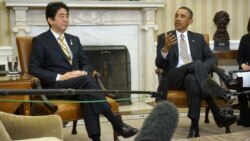The close and long-standing friendship between the United States and Japan was on display during Japanese Prime Minister Shinzo Abe and Japanese Foreign Minister Fumio Kishida’s February 22nd visit to Washington, DC.
After a meeting in the White House with Prime Minister Abe, President Barack Obama called the U.S.-Japanese alliance “the central foundation for our regional security and so much of what we do in the Pacific region.”
“We had close consultations on a wide range of security issues, in particular, our concerns about the provocative actions that have been taken in North Korea and our determination to take strong actions in response,” said President Obama.
“We also discussed a wide range of multilateral issues, and I expressed my appreciation for the support Japan has provided to our efforts in Afghanistan, our efforts to resolve the nuclear issue in Iran, and we expressed mutual condolences around the loss of life at the BP plant in Algeria and pledged that this would spur greater counterterrorism cooperation.”
Regarding the close economic cooperation between the United States and Japan, President Obama said that both he and Prime Minister Abe agreed that our nations’ first priorities must be to ensure that the American and Japanese people have “the opportunity to prosper if they’re willing to work hard.”
Following the visit, the White House released a joint statement saying that the two countries would continue bi-lateral consultations with respect to Japan’s possible interest in joining the Trans-Pacific Partnership, a multi-national trade agreement among countries in Asia, North America and South America.
The same day, Japanese Foreign Minister Kishida met with Secretary of State John Kerry at the State Department. Secretary Kerry also expressed appreciation for Japan’s support for U.S. efforts in Afghanistan, as well as Japan’s efforts to promote nuclear nonproliferation and its determination to try to reduce global greenhouse gas emissions. In addition, Secretary Kerry praised the restraint Japan has shown in the face of tensions involving the Senkaku islands, which are also claimed by China, noting Japan’s “attempts to make sure that this does not flare up into a significant confrontation.”
Secretary Kerry reaffirmed that Japan and the United States are two “very special friends” which have formed an alliance that has evolved into a “global partnership…critical to the peace and security of the Asia Pacific.”
After a meeting in the White House with Prime Minister Abe, President Barack Obama called the U.S.-Japanese alliance “the central foundation for our regional security and so much of what we do in the Pacific region.”
“We had close consultations on a wide range of security issues, in particular, our concerns about the provocative actions that have been taken in North Korea and our determination to take strong actions in response,” said President Obama.
“We also discussed a wide range of multilateral issues, and I expressed my appreciation for the support Japan has provided to our efforts in Afghanistan, our efforts to resolve the nuclear issue in Iran, and we expressed mutual condolences around the loss of life at the BP plant in Algeria and pledged that this would spur greater counterterrorism cooperation.”
Regarding the close economic cooperation between the United States and Japan, President Obama said that both he and Prime Minister Abe agreed that our nations’ first priorities must be to ensure that the American and Japanese people have “the opportunity to prosper if they’re willing to work hard.”
Following the visit, the White House released a joint statement saying that the two countries would continue bi-lateral consultations with respect to Japan’s possible interest in joining the Trans-Pacific Partnership, a multi-national trade agreement among countries in Asia, North America and South America.
The same day, Japanese Foreign Minister Kishida met with Secretary of State John Kerry at the State Department. Secretary Kerry also expressed appreciation for Japan’s support for U.S. efforts in Afghanistan, as well as Japan’s efforts to promote nuclear nonproliferation and its determination to try to reduce global greenhouse gas emissions. In addition, Secretary Kerry praised the restraint Japan has shown in the face of tensions involving the Senkaku islands, which are also claimed by China, noting Japan’s “attempts to make sure that this does not flare up into a significant confrontation.”
Secretary Kerry reaffirmed that Japan and the United States are two “very special friends” which have formed an alliance that has evolved into a “global partnership…critical to the peace and security of the Asia Pacific.”






